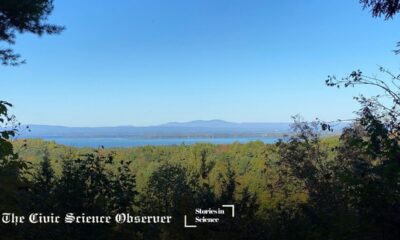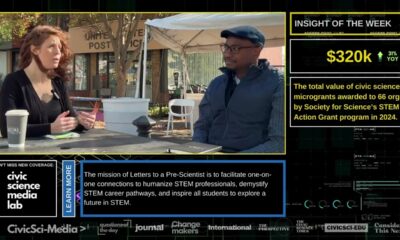Stories in Science Special Series
Finding a Passion for Physics and Virtual Reality Headsets
Haxhi Pantina: “To this day, I still like reading about stars and the universe, but quantum mechanics, quantum optics, and quantum information contain the largest part of my daily routine.”
Haxhi Pantina
Haxhi Pantina is a graduate student studying physics at the University of Vienna in Austria. He is originally from Kosovo, a small country in Southeastern Europe. He holds a BSc degree in physics from the University of Prishtina. Haxhi is a physics, maths, and tech enthusiast. The story below was edited by Katelyn Comeau.

When Einstein was a little kid, his father bought him a compass as a gift. The little Einstein was simply amazed by it. It was that moment, as Einstein would later himself say, that marked the beginning of his outstanding scientific journey. Many other great minds in the history of humanity had similar stories: at a very young age, they had their first contact with a natural phenomenon or object that sparked in their interest and drove them towards a life-long passion for science.
It always amazed me how such experiences could have a huge impact on one’s life. In contrast to Einstein and other science giants, I don’t remember having any particular experience that locked my interest into science. For me, it was not a matter of a single event, but rather many of them.
I remember that as a kid I enjoyed spending hours laying down in the garden of our home with my siblings during summer nights and watching stars. We tried to see if some of those shining dots in the clear sky displayed certain figures. We also competed with each other at who came first at spotting human-made satellites flying over from time to time.
I remember I found magnetism and electricity very interesting as well. Of course I didn’t understand these concepts at that time, but I was able to play with them. Whenever I saw ruined electrical devices, I broke them into pieces and looked for magnets and small electromotors inside. For instance, I noticed that when I manually rotated the rotor of an electromotor, a tiny light bulb connected to it lit up. I then made some wings out of paper and attached them to the rotor. Then I would run through the garden at the night holding the little contraption so that the lightbulb would light up. This was particularly fun in windy weather.
In hindsight, it probably was not surprising that I showed in particular interest in physics and maths from a young age at school. I came to really enjoy trying to perform simple physics experiments and calculate things. For instance, I tried to calculate the gravity constant with a pendulum that I made myself. In some higher school years we began to learn about stars and universe, some topics that particularly triggered my imagination at that time.
Today when I look back at those times, I’m convinced that time of my life was when I finally realized that physics is what I wanted to do for living.
Driven by my motivation to learn as much as possible about physics, I began my undergraduate studies with a focus on that field. A lot changed about me at this stage of my life. I still had the same passion, but my perspective was widened as I was introduced to many more fascinating parts of physics through many interesting classes. Consequently, my interests within the field were shaped.
I think this exposure to different parts of an area of study is very important in one’s personal and career development – this was definitely the case for me. It helped me understand my interests better in that it helped me uncover what I was driven to learn about and research on a daily basis. To this day, I still like reading about stars and the universe, but quantum mechanics, quantum optics, and quantum information contain the largest part of my daily routine.
Quantum mechanics is the mathematical formalism used to explain the physics of the microworld. Similarly, quantum optics is the theory of explaining phenomena related to light at the photonic level. Quantum information is the branch of physics that tries to make use of both of them to develop a new generation of computers and enable communication protocols that are safe under every eavesdropping threat. I chose these subjects because I found them very interesting and innovative – the idea of being able to use quantum mechanics for something so practical like computers amazed me.
Following my graduation, I decided to take on a new journey abroad by starting my Master’s program in Physics at the University of Vienna in Austria. Of course, my initial motivation for this decision was the idea of getting an internationally-praised level of academic education. However, in my view, a study abroad experience was more than that. It was about meeting people coming from all around the world, discovering new cultures, listening to amazing stories and collecting unforgettable memories.
Most importantly for me, it meant I would be in an environment where I could fully immerse myself in my work and in subjects of physics. It was incredible to be in a place where there was so much science happening at once and I had the opportunity to interact with it. In other words, this opportunity allowed me to focus on both professional and personal growth.
Looking back after my study abroad experience, what I missed the most during my undergraduate studies was practical work. I know that undergraduate studies are supposed to set the necessary base to build a future career on, but I desperately wanted to engage in practical physics. I wanted to somehow be able to see and touch my work as a physicist. In my mind (as to many others I guess) it was a lot more satisfying than just trying to do science on paper and not seeing it in real life. Fortunately, my master’s degree study program in the Department of Physics is giving me these opportunities.
I get access to so many research area and tons of opportunities for practical work. This is often with key players in certain industries which opens the doors for collaborations and initiation of training programs. Thanks to all this I’ve discovered for myself what I want to be in physics and that is work in quantum optics and quantum information.
The practical work I’ve been involved in so far has had a massive role in narrowing down my interests.
As a part of my studies I’ve recently been working with a virtual reality company in Austria called Junge Römer on how to further develop the optical performance of current virtual reality (VR) headsets.
It is enjoyable experience being able to make use of your theoretical knowledge for practical purposes, especially in an area of intensive research like the optical performance of VR systems. In addition to it, I like the moral side that comes with it as VR applicability in other areas like medicine and education depends highly on overcoming these optical issues related to them.
I can imagine that there are many people in a similar situation I was in not long ago: not knowing what particular field to focus on or what a fitting career goal is. I think what helped me the most in my decision was to try different areas and experiment with everything. One can feel some sort of guilt abandoning some childhood dreams, but one must not.
The truth is that we’re often not able to tell if we like something or not without first trying it ourselves in the first place. A journey in science is a very dynamic process; you won’t necessarily have figured out what career you want in science at a very young age, and that’s okay. Therefore, enjoy trying out different disciplines of your favourite subjects. After all, whatever you’re going to do, you will be still doing science and that is in itself exciting enough.
ABOUT: Stories in Science is a special series on the Civic Science Times. The main aim is to document the first-hand accounts of the human stories behind the science being published by scientists around the world. Such stories are an important element behind the civic nature of science.
SUBMISSION: Click here to access the story guidelines and submission portal. Please note that not all stories are accepted for publication. After submission, we will let you know whether we have selected the story for the review process.
The CS Media Lab is a Boston-anchored civic science news collective with local, national and global coverage on TV, digital print, and radio through CivicSciTV, CivicSciTimes, and CivicSciRadio. Programs include Questions of the Day, Changemakers, QuickTake, Consider This Next, Stories in Science, Sai Resident Collective and more.

-
Audio Studio1 month ago
“Reading it opened up a whole new world.” Kim Steele on building her company ‘Documentaries Don’t Work’
-
Civic Science Observer1 week ago
‘Science policy’ Google searches spiked in 2025. What does that mean?
-
Civic Science Observer1 month ago
Our developing civic science photojournalism experiment: Photos from 2025
-
Civic Science Observer1 month ago
Together again: Day 1 of the 2025 ASTC conference in black and white
Contact
Menu
Designed with WordPress

























